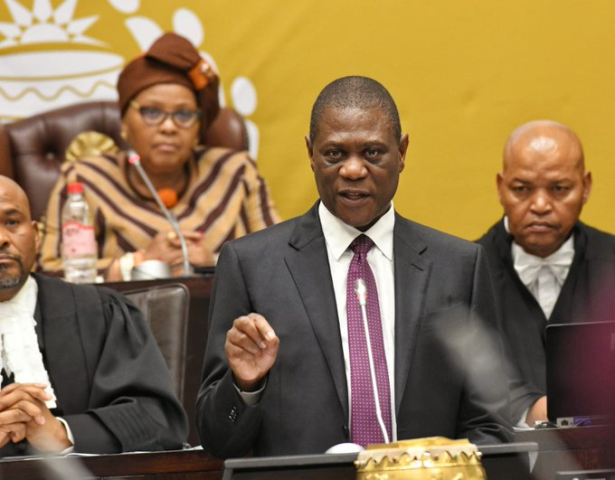SA Intensifies Drive to Rescue Local Governance and Protect Health Services
Speaking during a recent oral question session in Parliament, Mashatile described a deteriorating local governance landscape that is undermining growth, service delivery, and investor confidence.

- Country:
- South Africa
South Africa’s Deputy President Paul Mashatile has outlined an ambitious suite of government interventions designed to address the deepening crisis facing the country’s municipalities and to mitigate the impact of international health funding cuts. Speaking during a recent oral question session in Parliament, Mashatile described a deteriorating local governance landscape that is undermining growth, service delivery, and investor confidence.
A Turning Point for Local Government
Mashatile underscored that weak and often unstable governance structures, coupled with inadequate revenue generation and financial mismanagement, are among the key impediments to effective local government operations. “The deteriorating levels of municipal performance have emerged as a significant constraint to growth and investment,” he said, pointing to the widespread impact of administrative collapse in municipalities across the country.
In response to this governance crisis, the Cabinet convened in September 2024 to establish a high-level Inter-Ministerial Committee (IMC) on the Municipal Performance Turnaround Plan (MPTP). Chaired by the Minister of Cooperative Governance and Traditional Affairs (CoGTA), the committee aims to drive structured reforms in governance, financial accountability, and service delivery across the most distressed municipalities.
Of the ten municipalities identified by the Presidency as being in dire need, eight have already commenced the development of their turnaround strategies, working closely with a technical task force under the IMC. The initiative prioritizes crafting enforceable Financial Recovery Plans, effective budget management practices, and improvements in core services such as water supply, electricity, and waste management.
Operation Vulindlela Phase 2: A Broader Structural Reform Agenda
Further bolstering the effort, President Cyril Ramaphosa recently launched Phase 2 of Operation Vulindlela, a flagship reform programme that seeks to remove structural barriers to service delivery and economic development. The second phase will span five years and will focus heavily on the local government sphere.
Key to this phase is a comprehensive review of two foundational policy frameworks: the 1998 White Paper on Local Government and the Local Government Funding Model. A discussion document has already been released to encourage public debate, with a revised white paper expected by March 2026.
The reform package also includes the Metro Trading Services Programme (MTSP), which is set to take effect on 1 July 2025. Targeting South Africa’s eight major metropolitan municipalities—City of Tshwane, Johannesburg, Ekurhuleni, Cape Town, eThekwini, Buffalo City, Mangaung, and Nelson Mandela Bay—the MTSP will drive improvements in financial viability, technical operations, and corporate governance of municipal trading entities.
District Development Model and Urban Service Delivery
To address immediate and acute service delivery failures in major urban centers, President Ramaphosa has activated targeted District Development Model (DDM) support initiatives. These include the Presidential eThekwini Working Group and the Presidential Johannesburg Working Group, which are providing municipalities with much-needed technical and financial support.
“These support mechanisms include, but are not limited to, assistance in developing and implementing turnaround plans in water and electricity distribution,” Mashatile noted. These efforts are aimed at reducing urban backlogs, stabilizing service provision, and improving quality of life for residents in key metropolitan regions.
Responding to the Health Crisis: PEPFAR Withdrawal and Government Action
In a significant parallel challenge, South Africa’s public health sector is facing severe disruptions following the United States government’s decision to scale back funding under the President’s Emergency Plan for AIDS Relief (PEPFAR). Mashatile described the consequences as potentially devastating, warning of an increase in HIV-related deaths and new infections over the next decade if the funding gap is not addressed.
Citing data from UNAIDS and other health partners, the Deputy President acknowledged the job losses and disruption in HIV, tuberculosis (TB), and sexually transmitted infection (STI) services already taking place. “The abrupt withdrawal of the funding has resulted in job losses and a negative impact on the national response to HIV, TB, and STIs,” he said.
Government's Mitigation Measures and Funding Appeals
To counter the fallout, several interventions are underway:
-
Science and Innovation Working Group: A newly formed body is advising the Minister of Science, Technology and Innovation, Blade Nzimande, on how the funding cuts may affect critical health research and development programmes.
-
National Treasury Discussions: The Minister of Health, Aaron Motsoaledi, is in high-level talks with Finance Minister Enoch Godongwana to explore the possibility of allocating state funds to cover some of the shortfalls.
-
National Lotteries Commission Support: The Commission is reviewing a funding application for the “Close the Gap” HIV Treatment Campaign and the “End TB Campaign” under its discretionary emergency funding category.
Mashatile expressed cautious optimism that these resource mobilization efforts will succeed. “We are hopeful that all these efforts will yield positive results, as we cannot afford to have service delivery gaps in health programmes, particularly those focusing on HIV and TB,” he said.
He reaffirmed government’s commitment to ensuring continuity in essential health services and closing any gaps left by foreign aid withdrawals. “We will continue with our efforts to find sufficient resources to sustain our health programmes.”










